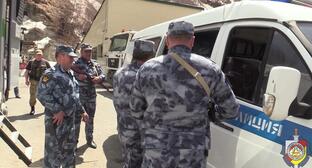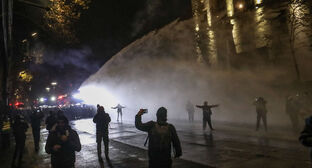
22 April 2010, 19:00
Participants of Moscow-Yerevan space bridge: recognition of Armenians' genocide will not strike Turkey in any way
On April 21, the press centre of the RIA of "Novosti" held a TV space bridge "Moscow-Yerevan" dated to the 95th anniversary of Armenians' genocide in the Ottoman Turkey. The main debated topic was in the reasons why the modern Turkey refuses to recognize the fact of genocide.
Alexander Iskandaryan, Director of the Institute of the Caucasus, said that Armenia "has no need to issue a document on genocide: our grandmothers told us about it." He emphasized that the refusal of this or that country to recognize the fact of Armenians' genocide, as he knows from private talks with officials, is caused by the great interests in Turkey this or that country has.
As to Turkey, in the opinion of the Director, people there would not like to pronounce "genocide", as it may lead to "certain problems." "But there'll be no problems, as the Ottoman Empire will be found guilty; but it doesn't exist," said Iskandaryan and noted that such moods, in his opinion, became possible because in due time Turkey failed to run the procedure similar to the one undertaken by Germany after WWII - denazification.
Vladimir Zharikhin, Deputy Director of the CIS Institute, noted that finding a balance in the present world between the historical memory and the need to live in the conditions of uneasy geopolitical situation is rather difficult. He blamed Diasporas for their absolutizing the issues of historical memory and under-accounting the interests of the countries where they lived; it results in spoilage of relations between countries. As an example he named Ukraine, where, according to his story, the Ukrainian Diaspora absolutized the historical memory; and it resulted in a number of Ukraine's conflicts with its neighbours.
Aik Demoyan, Director of the Institute-Museum of Armenians' Genocide, noted that "Azerbaijan is actively manipulating" the genocide topic, and, according to his story, also invents "artificial traumas" by accusing of some "alleged Azerbaijanis' genocide not only Armenians, but also Russians, who actively support Armenians."
Vladimir Zakharov, Deputy Director of the Centre of Caucasian Studies of the Moscow State Institute for International Relations (known as "MGIMO") noted that in conversations with Turkish diplomats he repeatedly asked them why Turkey had even never apologized for the fact of genocide: "They said that 'Dashnaktsutyun' was guilty. I said: plenty of documents have been published indicating that Turkish authorities were guilty. They said: we are afraid that will be as with the Holocaust, Armenians will demand monetary and territorial indemnifications." He has also noted that the part of Turkish elite gradually starts to understand that closing of borders with Armenia brakes the introduction of Turkey into European Union.
Aik Demoyan also told about the help of Russia to Armenians - genocide victims. "We should give tribute of memory to the victims, but also praise those, who, risking their lives, helped us by raising the voice of protest. In five years we'll mark the 100th anniversary of genocide; and it's important that the public of the two countries adjoin not only in mourning over the victims. Our duty is to restore the picture, present the information that tells about the humanitarian intervention of the Russian army," he said.
He said about the agreement reached with the Russian embassy about holding a respective exhibition in Moscow and St Petersburg.
Author: Semen Charnyj Source: Especially for “Caucasian Knot”




